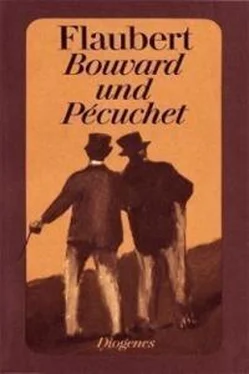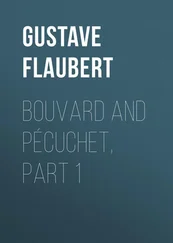Bouvard and Pécuchet
A Tragi-comic Novel of Bourgeois Life
Gustave Flaubert
Chapter I.
Kindred Souls.
As there were thirty–three degrees of heat the Boulevard Bourdon was absolutely deserted.
Farther down, the Canal St. Martin, confined by two locks, showed in a straight line its water black as ink. In the middle of it was a boat, filled with timber, and on the bank were two rows of casks.
Beyond the canal, between the houses which separated the timber–yards, the great pure sky was cut up into plates of ultramarine; and under the reverberating light of the sun, the white façades, the slate roofs, and the granite wharves glowed dazzlingly. In the distance arose a confused noise in the warm atmosphere; and the idleness of Sunday, as well as the melancholy engendered by the summer heat, seemed to shed around a universal languor.
Two men made their appearance.
One came from the direction of the Bastille; the other from that of the Jardin des Plantes. The taller of the pair, arrayed in linen cloth, walked with his hat back, his waistcoat unbuttoned, and his cravat in his hand. The smaller, whose form was covered with a maroon frock–coat, wore a cap with a pointed peak.
As soon as they reached the middle of the boulevard, they sat down, at the same moment, on the same seat.
In order to wipe their foreheads they took off their headgear, each placing his beside himself; and the little man saw "Bouvard" written in his neighbour's hat, while the latter easily traced "Pécuchet" in the cap of the person who wore the frock–coat.
"Look here!" he said; "we have both had the same idea—to write our names in our head–coverings!"
"Yes, faith, for they might carry off mine from my desk."
"'Tis the same way with me. I am an employé."
Then they gazed at each other. Bouvard's agreeable visage quite charmed Pécuchet.
His blue eyes, always half–closed, smiled in his fresh–coloured face. His trousers, with big flaps, which creased at the end over beaver shoes, took the shape of his stomach, and made his shirt bulge out at the waist; and his fair hair, which of its own accord grew in tiny curls, gave him a somewhat childish look.
He kept whistling continually with the tips of his lips.
Bouvard was struck by the serious air of Pécuchet. One would have thought that he wore a wig, so flat and black were the locks which adorned his high skull. His face seemed entirely in profile, on account of his nose, which descended very low. His legs, confined in tight wrappings of lasting, were entirely out of proportion with the length of his bust. His voice was loud and hollow.
This exclamation escaped him:
"How pleasant it would be in the country!"
But, according to Bouvard, the suburbs were unendurable on account of the noise of the public–houses outside the city. Pécuchet was of the same opinion. Nevertheless, he was beginning to feel tired of the capital, and so was Bouvard.
And their eyes wandered over heaps of stones for building, over the hideous water in which a truss of straw was floating, over a factory chimney rising towards the horizon. Sewers sent forth their poisonous exhalations. They turned to the opposite side; and they had in front of them the walls of the Public Granary.
Decidedly (and Pécuchet was surprised at the fact), it was still warmer in the street than in his own house. Bouvard persuaded him to put down his overcoat. As for him, he laughed at what people might say about him.
Suddenly, a drunken man staggered along the footpath; and the pair began a political discussion on the subject of working–men. Their opinions were similar, though perhaps Bouvard was rather more liberal in his views.
A noise of wheels sounded on the pavement amid a whirlpool of dust. It turned out to be three hired carriages which were going towards Bercy, carrying a bride with her bouquet, citizens in white cravats, ladies with their petticoats huddled up so as almost to touch their armpits, two or three little girls, and a student.
The sight of this wedding–party led Bouvard and Pécuchet to talk about women, whom they declared to be frivolous, waspish, obstinate. In spite of this, they were often better than men; but at other times they were worse. In short, it was better to live without them. For his part, Pécuchet was a bachelor.
"As for me, I'm a widower," said Bouvard, "and I have no children."
"Perhaps you are lucky there. But, in the long run, solitude is very sad."
Then, on the edge of the wharf, appeared a girl of the town with a soldier,—sallow, with black hair, and marked with smallpox. She leaned on the soldier's arm, dragging her feet along, and swaying on her hips.
When she was a short distance from them, Bouvard indulged in a coarse remark. Pécuchet became very red in the face, and, no doubt to avoid answering, gave him a look to indicate the fact that a priest was coming in their direction.
The ecclesiastic slowly descended the avenue, along which lean elm trees were placed as landmarks, and Bouvard, when he no longer saw the priest's three–cornered head–piece, expressed his relief; for he hated Jesuits. Pécuchet, without absolving them from blame, exhibited some respect for religion.
Meanwhile, the twilight was falling, and the window–blinds in front of them were raised. The passers–by became more numerous. Seven o'clock struck.
Their words rushed on in an inexhaustible stream; remarks succeeding to anecdotes, philosophic views to individual considerations. They disparaged the management of the bridges and causeways, the tobacco administration, the theatres, our marine, and the entire human race, like people who had undergone great mortifications. In listening to each other both found again some ideas which had long since slipped out of their minds; and though they had passed the age of simple emotions, they experienced a new pleasure, a kind of expansion, the tender charm associated with their first appearance on life's stage.
Twenty times they had risen and sat down again, and had proceeded along the boulevard from the upper to the lower lock, each time intending to take their departure, but not having the strength to do so, held back by a kind of fascination.
However, they came to parting at last, and they had clasped each other's hands, when Bouvard said all of a sudden:
"Faith! what do you say to our dining together?"
"I had the very same idea in my own head," returned Pécuchet, "but I hadn't the courage to propose it to you."
And he allowed himself to be led towards a little restaurant facing the Hôtel de Ville, where they would be comfortable.
Bouvard called for the menu . Pécuchet was afraid of spices, as they might inflame his blood. This led to a medical discussion. Then they glorified the utility of science: how many things could be learned, how many researches one could make, if one had only time! Alas! earning one's bread took up all one's time; and they raised their arms in astonishment, and were near embracing each other over the table on discovering that they were both copyists, Bouvard in a commercial establishment, and Pécuchet in the Admiralty, which did not, however, prevent him from devoting a few spare moments each evening to study. He had noted faults in M. Thiers's work, and he spoke with the utmost respect of a certain professor named Dumouchel.
Bouvard had the advantage of him in other ways. His hair watch–chain, and his manner of whipping–up the mustard–sauce, revealed the greybeard, full of experience; and he ate with the corners of his napkin under his armpits, giving utterance to things which made Pécuchet laugh. It was a peculiar laugh, one very low note, always the same, emitted at long intervals. Bouvard's laugh was explosive, sonorous, uncovering his teeth, shaking his shoulders, and making the customers at the door turn round to stare at him.
Читать дальше








![Гюстав Флобер - Закат Карфагена [Сборник]](/books/414440/gyustav-flober-zakat-karfagena-sbornik-thumb.webp)


